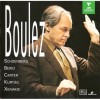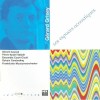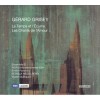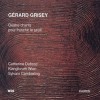| 国家: | 法国 |
| 期间: | Contemporary classical music, Spectralism |
传记
Gérard Grisey (/ˈɡrɪzɨ/; French: [ɡʁizɛ]; June 17, 1946 – November 11, 1998) was a French composer of contemporary music.
Gérard Grisey was born in Belfort, France on 17 June 1946. He studied at the Trossingen Conservatory in Germany from 1963 to 1965 before entering the Conservatoire de Paris, where he studied with Olivier Messiaen from 1965–67 and again from 1968–72, working with Henri Dutilleux at the Ecole Normale in 1968 (Anderson 2001). He won prizes for piano accompaniment, harmony, counterpoint, fugue, and composition at the Conservatoire.[citation needed] He also studied electroacoustics with Jean-Etienne Marie in 1969), composition with Iannis Xenakis and György Ligeti at the Darmstädter Ferienkurse in 1972, and acoustics with Emile Leipp at the Faculté des Sciences in 1974 ((Anderson 2001). Other studies were undertaken in the summer of 1969 at the Accademia Chigiana in Siena and in Darmstadt with Karlheinz Stockhausen.[citation needed]
Grisey won the highly coveted Prix de Rome and stayed at the Villa Medici in Rome from 1972 to 1974, and in 1973 founded a group called L’itinéraire with Tristan Murail, Roger Tessier and Michael Levinas, later to be joined by Hugues Dufourt. Dérives, Périodes, and Partiels were among the first pieces of spectral music. In 1974-75, he studied acoustics with Emile Leipp at the Paris VI University, and in 1980 became a trainee at the IRCAM (Institut de Recherche et Coordination Acoustique/Musique). In the same year he went to Berlin as a guest of the D.A.A.D., and afterwards left for the University of California, Berkeley, where he was appointed professor of theory and composition (1982-1986). After returning to Europe, he taught composition at the Conservatoire de Paris, and held numerous composition seminars in France (Centre Acanthes, Lyon, Paris) and abroad (Darmstadt, Freiburg, Milan, Reggio Emilia, Oslo, Helsinki, Malmö, Göteborg, Los Angeles, Stanford, London, Moscow, Madrid, etc.) For notable pupils see: List of music students by teacher#Gérard Grisey.
Gérard Grisey died at the age of 52 in Paris on 11 November 1998 due to a ruptured aneurysm.
Among his works, most of which were commissioned by famous institutions and international instrumental groups, are Dérives 1974, Jour, contre-jour 1979, Tempus ex machina 1979, Les chants de l’amour 1984, Talea 1986, Le temps et l’écume 1989, Le noir de I’etoile 1990, L’icône paradoxale 1994, Les espaces acoustiques (a cycle consisting of six pieces), Vortex temporum 1995 and Quatre chants pour franchir le seuil 1998.
Grisey's music is often considered to belong to the genre of spectral music, which he is credited with founding along with fellow composer Tristan Murail, although he later disowned the label in interviews and writings. Nonetheless, he spent much of his career exploring the spectrum of tone colour between harmonic overtones and noise. In addition, he was fascinated by musical processes which unfold slowly, and he made musical time a major element of many of his pieces.
He expressed the opinion that: "We are musicians and our model is sound not literature, sound not mathematics, sound not theatre, visual arts, quantum physics, geology, astrology or acupuncture" (Fineberg 2006, p. 105).










